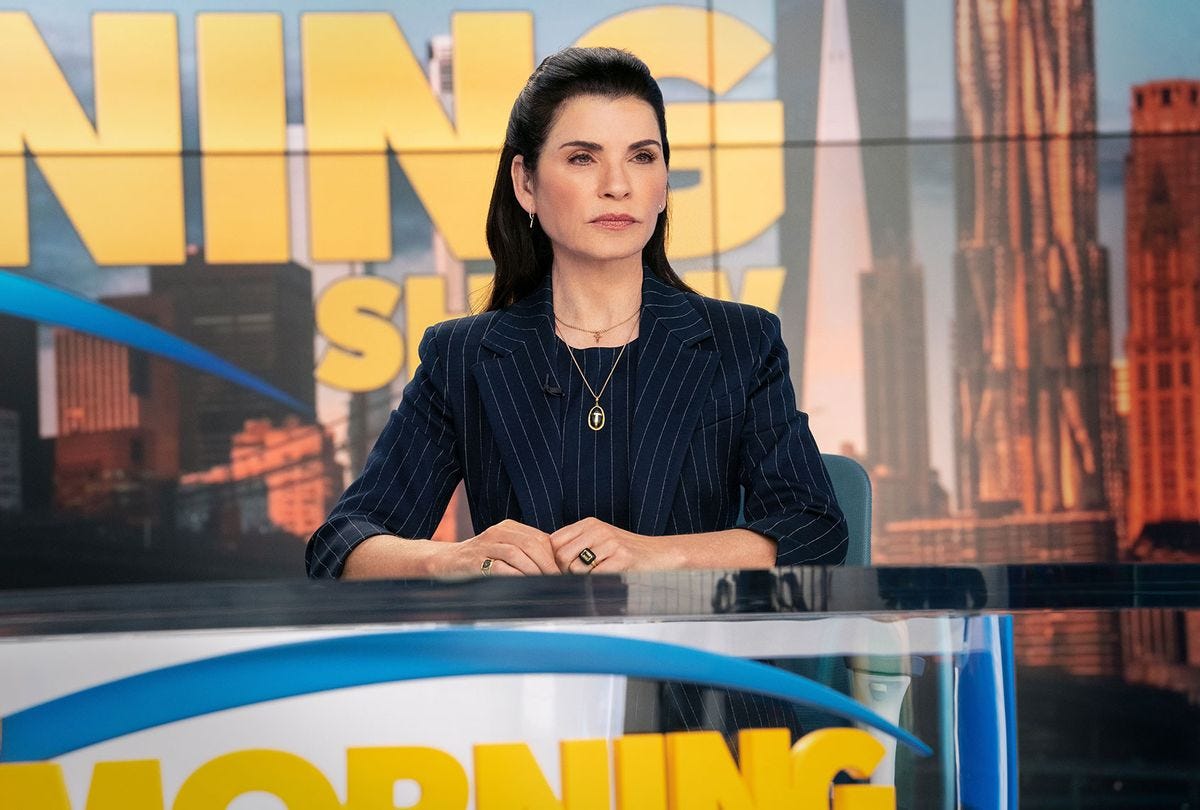On the Method, part 3
as a lesbian
You know, there was a film being shown by this Black lesbian club on the Columbia campus and they put up signs that said, “no Jews allowed.” And as someone who plays a lesbian journalist on The Morning Show, I am more offended by it as a lesbian than I am as a Jew, to be honest with you.
—Actor Julianna Margulies
A few months ago, I began a series about how common misconceptions about Method acting inform the ways we understand not just films and plays, but the (bad) behavior of the artists who create them. I used Jonathon Majors and Tom Cruise to begin exploring how these misconceptions are cynically leveraged by industry agents, lawyers, and executives to reinforce any definition of art or authenticity that align them with capital—to the point that an artist’s violent interpersonal behavior can be entirely excused, especially if they happen to be bankrolled by a billion-dollar franchise.
There’s no need to limit ourselves to Majors or Cruise. It’s all too easy to come up with celebrities whose violent behavior has been downplayed, dismissed, and even defended because it was executed within the moral void that the Method supposedly creates. Dustin Hoffman, who was not just famously but infamously scolded by Laurence Olivier for depriving himself of sleep to prepare for a scene in John Schlesinger’s 1976 film, Marathon Man (“My dear boy, why don’t you just try acting?” the great Shakespearean is said to have said), brought this approach to the set of Kramer vs. Kramer three years later. According to a 2016 biography of Meryl Streep, Hoffman, “allegedly slapped…and taunted her with the name of her recently deceased boyfriend during…filming”1. Anything that gets you into character, right? How generous of Hoffman to support his colleague in doing the same!
I think of the Method as a dialectic2 of sorts: this series of techniques, exercises, and preparations for performance is undertaken in order to create the circumstances for artistic inspiration—meaning that while it cannot guarantee that inspiration, per the Method’s father, Konstantin Stanislavski, such inspiration almost certainly cannot happen without it. Contrast this with this “the ends justify the means” interpretation of the Method that I’ve outlined above, which reduces this somatic tradition of art-making to a rhetorical framework: This violence didn’t happen, and if it did, it doesn’t matter, because it was done in the name of Art. In this mindset, not only is art is degraded by the elevation of violence, but violence becomes a prerequisite of Art, a designation that can only hope to one day measure up the most valuable commodity of all: the intellectual property.
Which brings me Julianna Margulies, she of The Good Wife fame, whose recent racist and genocidal statements (and non-apology) regarding black lesbians, queer and trans people, and the Palestinian people—who, at the time of this writing, are undergoing a post-“humanitarian pause” intensification of assault by the Israeli army, which is using AI technology to create a “mass assassination factory” of cornered human beings—drew outrage from anyone of conscience.
Now, to be clear, as far as I know, Margulies is not a Method actor. I can find no evidence that she had any Method training, nor has she made any other statements aligning herself with any of its associated schools of thought. But her bizarre claim of lesbian identity in order to access an (implicitly white) lesbian moral authority over the black dykes, queers, and trans students of Columbia University who are agitating against Zionism for free Palestine—all because of a role she plays for Apple TV!—immediately made me think of the ways that the Method is wrenched from its long, complex, interdisciplinary, and often politically progressive history of the performing arts to reinforce patriarchy, white supremacy, and capitalism3. Like the worst offenders of this co-optation, Margulies has allied herself with a nonexistent person (a random lesbian) over living, breathing, bleeding Palestinian people; no, not even with a nonexistent person, but with an identity category that politicians and warmongers are only too eager to pervert to keep us dykes, fags, and trannies that are in solidarity with the oppressed in line with their murderous objectives.
The 2016 Pulse nightclub shooting was the first time I ever heard Republicans prayerfully invoking the rights and safety of people like me—people “like me” meaning white gays, convenient pawns to shore up pro-war, pro-imperialist, and anti-Arab and Islamophobic sentiment. That’s where my mind goes when I hear shit like this from people like Margulies, all them of practically drooling over the fantasy of us getting thrown off rooftops so they can make real their other fantasy: the elimination of the Palestinian people.
Margulies’s impoverished conception of personhood is laid bare by her hackneyed approach to her art. One betrays the other. “Not in our name!” is insufficient, but it is the first step toward a bold and active solidarity movement; it is the beginning to something of substance, which I have not yet, but hope to, attain.
Find me on Twitter and Instagram. Get my second novel, X, right here. Learn more about the history of this newsletter here.
Remember when Hoffman went viral in 2013 for an interview where he cried about kinda realizing that women are people when making Tootsie (1982)? Then a few years later he got MeToo’d. Luckily, his friends who love women and are definitely not racist, like Liam Neeson, Bill Murray, and Chevy Chase, all came to his defense.
No promises that I’m using this term correctly. Here’s a meme.
Jade gets me: she sent me the link of Margulies’s statement with the very same idea.



